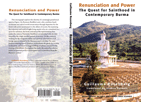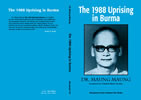Burma
Burma
#59 Renunciation and Power: The Quest for Sainthood in Contemporary Burma by Guillaume Rozenberg (translated from the French by Jessica L. Hackett). 180 pp, (2010)
$35.00 cloth; $20.00 paper
 This work deals with the quest for sainthood in contemporary Burmese society. It takes as examples, the trajectories, practices, and activities of eight living monks. Whereas the idea of renunciation is not difficult to delineate, its corollary - spiritual power - is more difficult to define. The book is an attempt to elucidate and characterize spiritual power as it develops and manifests itself in Burmese individuals engaged in the quest for sainthood.
This work deals with the quest for sainthood in contemporary Burmese society. It takes as examples, the trajectories, practices, and activities of eight living monks. Whereas the idea of renunciation is not difficult to delineate, its corollary - spiritual power - is more difficult to define. The book is an attempt to elucidate and characterize spiritual power as it develops and manifests itself in Burmese individuals engaged in the quest for sainthood.
Reviewers’ Comments: “… provides valuable empirical information about the centripetal appeal of these extraordinary monks and contributes to a wider discussion in regard to what he calls the ‘ideology of sainthood’ in Myanmar Buddhism’ ” -Hiroko Kawanami, Asian Ethnology
“Rozenberg has written an excellent book that scholars of religion and society in Myanmar must read. His attention to the complexity and blurred boundaries of religious categories should be the standard for future scholarship on the subject.” -Matthew J. Walton, New Mandala
>Click here for additional information
#49 The 1988 Uprising in Burma,by Dr. Maung Maung. 306 pp., (1999). $35.00 cloth; $22.00 paper
 A personal account of a critical turning point in Burmese history by someone closely involved in the events. Dr. Maung Maung, former president of the Socialist Republic of the Union of Burma, presents a set of reminiscences covering his part in events in Burma from the end of the war up through the day of the military takeover on September 18, 1988.
A personal account of a critical turning point in Burmese history by someone closely involved in the events. Dr. Maung Maung, former president of the Socialist Republic of the Union of Burma, presents a set of reminiscences covering his part in events in Burma from the end of the war up through the day of the military takeover on September 18, 1988.
Editorial Comments: “…an ‘insider’s` apologia….of lasting historical importance, given the unique vantage point of Dr. Maung Maung.” -James C. Scott
Reviewer’s Comments: “….an attempt to rewrite history, a whitewash….a blind eulogy to Burma’s aging strongman Gen Ne Win…bizarre interpretations of what happened in Rangoon twelve years ago.” -Bertil Lintner, The Irrawaddy
